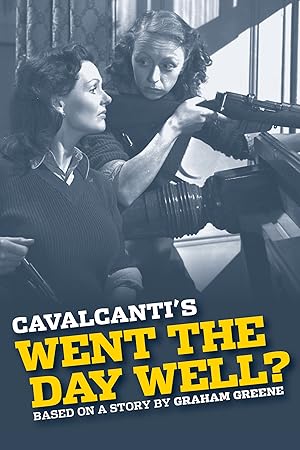
Went the Day Well? Page #6
A telegram? Has it been opened?
It wasn't in an envelope, just the form.
It was addressed "Fraser"
and signed "Maud."
I can't think what on earth I could have...
Why, I believe that's it.
It is, thank goodness for that.
We've been scoring on the back of it,
I'm afraid.
Never mind, I've found it,
that's the main thing.
Oh, but what about your game?
You'll need it for the score.
We'd just finished.
Oh, that's all right then.
Bit of a makeshift in here.
Not very comfy for you, is it?
No.
Oh, well, I'll be getting along then.
I haven't had this done for me
since I was about six.
- There you are.
- Thank you so much.
If you ask me,
I think he sprained his wrist on purpose.
gorging themselves on French wines,
I'm afraid I haven't much sympathy
for the French.
That's one of the many points
we disagree about, isn't it, Nora?
Well, they let us down so abominably.
I think they deserve to suffer for it.
My dear, I don't think anybody's so bad
that they deserve to live under Nazi rule.
Talking about France,
were you over there before Dunkirk?
Up to our necks in it, weren't we, Maxwell?
Yes, spent most of our time blowing up bridges
the French had forgotten to attend to.
- Absentminded fellows, the French.
- VICAR:
You mean fifth column?That must have been
the most unpleasant thing of all,
never knowing
who was working for the enemy.
I can't understand what a fifth columnist
hopes to gain, in the long run.
Power, I suppose.
Well, that's one thing
we haven't got to worry about.
No one can tell me there's a
potential fifth column in England.
Oh, I'm not so sure, Mrs Fraser,
you're just the type.
You love exercising power, now.
Now, you admit it.
There's something in that.
You'd better keep an eye on me
when the invasion comes.
This famous invasion that the papers
keep trying to scare us about.
You don't think it's a genuine possibility?
Personally, no.
The boche is devilishly good on propaganda.
They start the invasion rumours
in order to make us keep millions of men
tied up here in Britain.
Which is why we have the luck
to be sitting here
enjoying your excellent dinner, Mrs Fraser.
Well, excellent or otherwise,
I'm afraid that's all there is of it.
Oh, Mrs Fraser, it arrived this morning.
You've every right to be angry.
But it's only about your cousin
coming to tea tomorrow.
My clear Mrs Collins,
what are you talking about?
- A telegram. I've got it in here somewhere.
- Come inside.
That's me all over, what with the sergeant
calling for the keys, and all...
Coffee in ten minutes, Bridget.
Translation
Translate and read this script in other languages:
Select another language:
- - Select -
- 简体中文 (Chinese - Simplified)
- 繁體中文 (Chinese - Traditional)
- Español (Spanish)
- Esperanto (Esperanto)
- 日本語 (Japanese)
- Português (Portuguese)
- Deutsch (German)
- العربية (Arabic)
- Français (French)
- Русский (Russian)
- ಕನ್ನಡ (Kannada)
- 한국어 (Korean)
- עברית (Hebrew)
- Gaeilge (Irish)
- Українська (Ukrainian)
- اردو (Urdu)
- Magyar (Hungarian)
- मानक हिन्दी (Hindi)
- Indonesia (Indonesian)
- Italiano (Italian)
- தமிழ் (Tamil)
- Türkçe (Turkish)
- తెలుగు (Telugu)
- ภาษาไทย (Thai)
- Tiếng Việt (Vietnamese)
- Čeština (Czech)
- Polski (Polish)
- Bahasa Indonesia (Indonesian)
- Românește (Romanian)
- Nederlands (Dutch)
- Ελληνικά (Greek)
- Latinum (Latin)
- Svenska (Swedish)
- Dansk (Danish)
- Suomi (Finnish)
- فارسی (Persian)
- ייִדיש (Yiddish)
- հայերեն (Armenian)
- Norsk (Norwegian)
- English (English)
Citation
Use the citation below to add this screenplay to your bibliography:
Style:MLAChicagoAPA
"Went the Day Well?" Scripts.com. STANDS4 LLC, 2024. Web. 17 Jun 2024. <https://www.scripts.com/script/went_the_day_well_23229>.


Discuss this script with the community:
Report Comment
We're doing our best to make sure our content is useful, accurate and safe.
If by any chance you spot an inappropriate comment while navigating through our website please use this form to let us know, and we'll take care of it shortly.
Attachment
You need to be logged in to favorite.
Log In